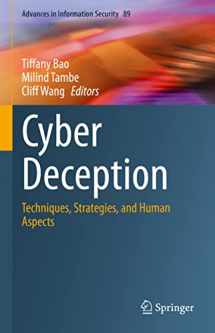
Cyber Deception: Techniques, Strategies, and Human Aspects (Advances in Information Security, 89)
Book details
Summary
Description
This book introduces recent research results for cyber deception, a promising field for proactive cyber defense. The beauty and challenge of cyber deception is that it is an interdisciplinary research field requiring study from techniques and strategies to human aspects.
This book covers a wide variety of cyber deception research, including game theory, artificial intelligence, cognitive science, and deception-related technology. Specifically, this book addresses three core elements regarding cyber deception: Understanding human’s cognitive behaviors in decoyed network scenarios Developing effective deceptive strategies based on human’s behaviors Designing deceptive techniques that supports the enforcement of deceptive strategies
The research introduced in this book identifies the scientific challenges, highlights the complexity and inspires the future research of cyber deception.
Researchers working in cybersecurity and advanced-level computer science students focused on cybersecurity will find this book useful as a reference. This book also targets professionals working in cybersecurity.
Chapter 'Using Amnesia to Detect Credential Database Breaches' and Chapter 'Deceiving ML-Based Friend-or-Foe Identification for Executables' are available open access under a Creative Commons Attribution 4.0 International License via link.springer.com.


We would LOVE it if you could help us and other readers by reviewing the book
Book review



